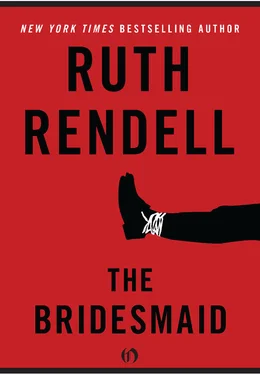Ruth Rendell - The Bridesmaid
Здесь есть возможность читать онлайн «Ruth Rendell - The Bridesmaid» весь текст электронной книги совершенно бесплатно (целиком полную версию без сокращений). В некоторых случаях можно слушать аудио, скачать через торрент в формате fb2 и присутствует краткое содержание. Год выпуска: 2010, Издательство: Open Road Integrated Media LLC, Жанр: Триллер, на английском языке. Описание произведения, (предисловие) а так же отзывы посетителей доступны на портале библиотеки ЛибКат.
- Название:The Bridesmaid
- Автор:
- Издательство:Open Road Integrated Media LLC
- Жанр:
- Год:2010
- ISBN:нет данных
- Рейтинг книги:3 / 5. Голосов: 1
-
Избранное:Добавить в избранное
- Отзывы:
-
Ваша оценка:
- 60
- 1
- 2
- 3
- 4
- 5
The Bridesmaid: краткое содержание, описание и аннотация
Предлагаем к чтению аннотацию, описание, краткое содержание или предисловие (зависит от того, что написал сам автор книги «The Bridesmaid»). Если вы не нашли необходимую информацию о книге — напишите в комментариях, мы постараемся отыскать её.
The Bridesmaid — читать онлайн бесплатно полную книгу (весь текст) целиком
Ниже представлен текст книги, разбитый по страницам. Система сохранения места последней прочитанной страницы, позволяет с удобством читать онлайн бесплатно книгу «The Bridesmaid», без необходимости каждый раз заново искать на чём Вы остановились. Поставьте закладку, и сможете в любой момент перейти на страницу, на которой закончили чтение.
Интервал:
Закладка:
“I’ve thought for ages she was wasted here,” said Christine. “She looks silly. Well, what I really mean is, she makes the rest of it look silly.”
It was true. The statue was too good for her surroundings. “Like putting champagne in a plastic cup,” said Philip.
“That’s it exactly.”
“You can give her away if you want to,” Cheryl said. “She’s yours. She’s not ours. Dad gave her to you.”
“I think of all the things as being ours,” Christine said, and then, “He’s got a lovely garden, he says. I think I’d feel better about Flora if I knew she was in her proper setting. Do you know what I mean?”
She looked at Philip. No amount of proselytising on the part of her daughters could persuade her of the equality of the sexes, no pressure from newspapers, magazines, or television convince her. Her husband was dead, so she looked to her son—not to her eldest child—for decisions, rulings, counsel.
“We’ll take her with us tomorrow,” Philip said.
It didn’t seem so very important at the time. Why should it? It didn’t seem one of those life or death decisions like whether or not to marry, have a child, change a career, have or not have the vital surgery. Yet it was as significant as any of those. Of course, it was to be a long time before he thought of it in those terms.
He tested Flora’s weight, lifting her up an inch or two. She was as heavy as he had expected. He suddenly found himself thinking of Flora as a symbol of his mother, who had come to his father on his marriage and was now to be passed on to Gerard Arnham. Did that mean Christine was contemplating marrying him? They had met the previous Christmas at Philip’s uncle’s office party, and it had been a slow courtship, if courtship it was. That might in part have been due to the fact that Arnham was always going abroad for his company. Arnham had only once been to his house, as far as Philip knew. Now they were going to meet him. That made it seem as if things were taking a more serious turn.
His mother said, “I don’t think we’d better take Hardy.” The little dog, the Jack Russell that Christine had named after Hardy Amies because she liked the clothes he designed, had come into the garden and stood close beside her. She bent down and patted his head. “He doesn’t like dogs. I don’t mean he’d be cruel to them or anything.” She spoke as if an antipathy to dogs often implied a willingness to torture them. “He just doesn’t care for them much. I could tell he didn’t like Hardy that evening he was here.”
Philip went back into the house and Fee said, “Seeing Flora reminded me Rebecca Neave once made a girl’s head.”
“What do you mean, ‘made a girl’s head?’”
“At school. In pottery. She made it in clay. It was life-size. The teacher made her break it up— she wouldn’t have it put in the kiln because we were supposed to be making pots. And, just imagine, she may be lying dead somewhere now.”
“I’d rather not imagine, thanks. I’m not fascinated by these things the way you are.”
Fee took Hardy onto her lap. He always came wooing people at this hour, hoping for a walk. “It’s not that I’m fascinated, Phil. We’re all interested in murder and violence and crime. They say it’s because we’ve got elements of it in ourselves. We’re all capable of murder, we all sometimes want to attack people, strike them, hurt them.”
“I don’t.”
“He really doesn’t, Fee,” said Cheryl. “You know he doesn’t. And he doesn’t like talking about it, so shut up.”
He was carrying Flora because he was the only male among them and therefore presumably the strongest. Without a car it was a terrible journey from Cricklewood to Buckhurst Hill. They had got the bus down to Kilburn station, the tube from Kilburn to Bond Street, and there waited ages for a Central Line train. It had been just before four when they left the house and it was ten to six now.
Philip had never been to this part of metropolitan Essex before. It reminded him a little of Barnet, where living had been gracious and the sun seemed always to shine. There were houses in the street they were walking up, but the buildings were hidden by hedges and trees and it might have been a country lane. His mother and sisters were all ahead of him now and he hurried up, shifting Flora onto the other side.
Cheryl, who had nothing to carry but was wearing high heels with her very tight jeans, said in a moaning way, “Is it much further, Mum?”
“I don’t know, dear. I only know what Gerard told me, up the hill and the fourth turning on the right.” Christine was always saying things were nice. “Nice” was her favourite word. “It’s a very nice part, isn’t it?”
She was wearing a pink linen dress with a white jacket. She had white beads and pink lipstick and looked the sort of woman who would scarcely stay single for long. Her hair was soft and fluffy, and the sunglasses hid the lines under her eyes. Philip had noticed that though she had her wedding ring on—he had never seen her without it—she had left off her engagement ring. Christine probably had some unexpressed, dotty reason for doing this, such as that engagement rings represented the love of a living husband while wedding rings were a social requirement for widows as well as wives. Fee, of course, was wearing her own engagement ring. The better to show it off, Philip conjectured, she carried something she called a clutch bag in her left hand. The formal dark blue suit with a too long skirt made her look older than she was—too old, Arnham might think, to be Christine’s daughter.
He hadn’t taken any particular pains over his appearance. His efforts had been concentrated on getting Flora ready. Christine had said to try and get that green stain off the marble, and he had a go with soap and water but unsuccessfully. She had provided tissue paper to wrap the statue in. Philip had wrapped her in a second layer of newspaper, that morning’s paper, which had the Rebecca Neave story spread all over the front page. There was another photograph of Rebecca and an account of how a man, unnamed, but aged twenty-four, had spent all the previous day with the police “Helping them with their enquiries.” Philip had quickly rolled the statue up in this paper and then bundled it into a plastic bag that Christine’s raincoat had been in when it came back from the cleaners.
This hadn’t perhaps been a good idea, for it made a slippery package. Flora kept slipping and having to be hoisted up again. His arms ached from shoulder to wrist. The four of them had turned, at last, into the road where Arnham lived. The houses weren’t detached as theirs in Barnet had been, but were terraced in curving rows, “town houses” with gardens full of shrubs and autumn flowers. Philip could see already that one of these gardens would be a more suitable setting for Flora. Arnham’s house was three storied, with Roman blinds at the windows and a brass lion’s-head knocker on the dark green Georgian front door. Christine paused at the gate with a look of wonder.
“What a pity he’s got to sell it! But it can’t be helped, I suppose. He has to share the proceeds with his ex-wife.”
It was unfortunate, Philip thought later, that Arnham opened the front door just at the moment when Cheryl said loudly, “I thought his wife was dead! I didn’t know he was divorced. Isn’t that yucky!”
Philip would never forget his first sight of Gerard Arnham. His first impression was that the man they were visiting was far from pleased to see them. He was of medium height, strongly built but not fat. His hair was grey but thick and sleek, and he was good-looking in what Philip thought of, without being able to explain why, as a sort of Italian or Greek way. His handsome features were fleshy and his lips full. He wore cream-coloured slacks, a white shirt with an open neck, and a lightweight jacket in a large but not overbold check of dark blue and cream and brown. The look on his face changed from dismay to an appalled disbelief that made him briefly close his eyes.
Читать дальшеИнтервал:
Закладка:
Похожие книги на «The Bridesmaid»
Представляем Вашему вниманию похожие книги на «The Bridesmaid» списком для выбора. Мы отобрали схожую по названию и смыслу литературу в надежде предоставить читателям больше вариантов отыскать новые, интересные, ещё непрочитанные произведения.
Обсуждение, отзывы о книге «The Bridesmaid» и просто собственные мнения читателей. Оставьте ваши комментарии, напишите, что Вы думаете о произведении, его смысле или главных героях. Укажите что конкретно понравилось, а что нет, и почему Вы так считаете.











